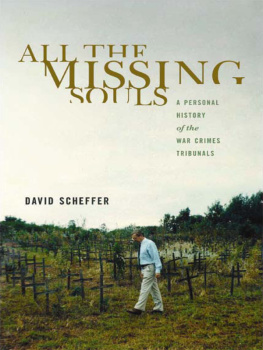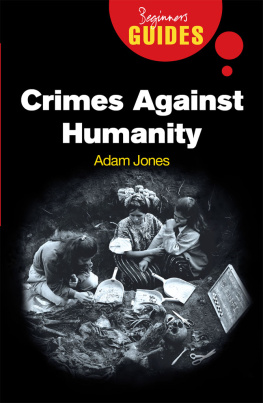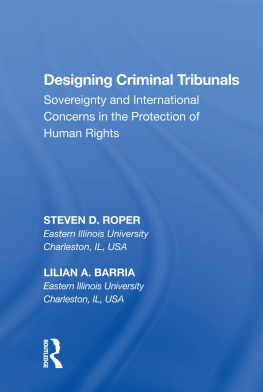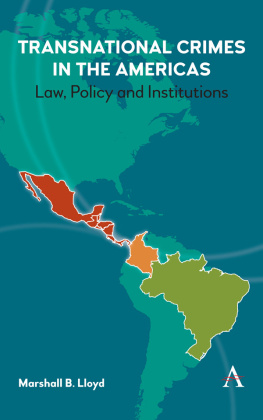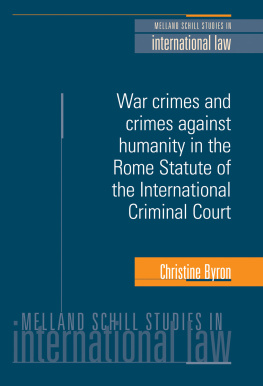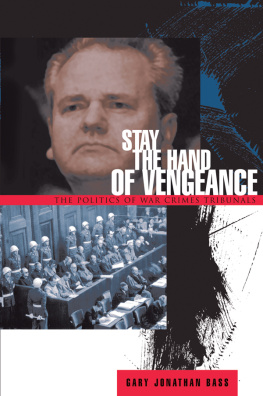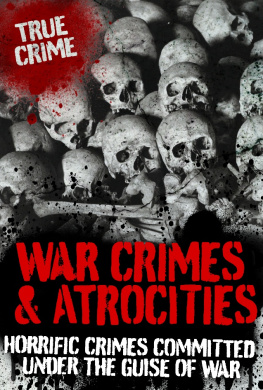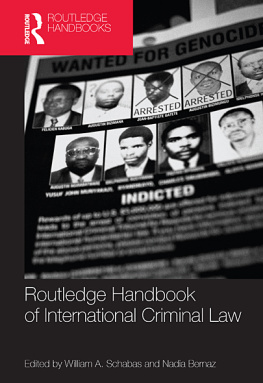All the Missing Souls

HUMAN RIGHTS AND CRIMES AGAINST HUMANITY
Eric D. Weitz, Series Editor
Echoes of Violence: Letters from a War Reporter by Carolin Emcke
Cannibal Island: Death in a Siberian Gulag by Nicolas Werth.
Translated by Steven Rendall with a foreword by Jan T. Gross
Torture and the Twilight of Empire from Algiers to Baghdad by Marnia Lazreg
Terror in Chechnya: Russia and the Tragedy of Civilians in War by Emma Gilligan
If You Leave Us Here, We Will Die: How Genocide Was Stopped in East Timor by Geoffrey Robinson
Stalins Genocides by Norman Naimark
Against Massacre: Humanitarian Intervention in the Ottoman Empire, 18151914 by Davide Rodogno
All the Missing Souls: A Personal History of the War Crimes Tribunals by David Scheffer
The Young Turks Crime against Humanity: The Armenian Genocide and Ethnic Cleansing in the Ottoman Empire by Taner Akam
ALL THE MISSING SOULS
A PERSONAL
HISTORY
of the
WAR CRIMES
TRIBUNALS
DAVID SCHEFFER
Copyright 2012 by Princeton University Press
Published by Princeton University Press,
41 William Street, Princeton, New Jersey 08540
In the United Kingdom: Princeton University Press,
6 Oxford Street, Woodstock, Oxfordshire OX20 1TW
press.princeton.edu
Cover photograph: Nyanza Massacre Site, September 1997.
Photo by James Stejskal.
All Rights Reserved
Fourth printing, and first paperback printing, 2013
Paperback ISBN 978-0-691-15784-9
The Library of Congress has cataloged the cloth edition of this book as follows
Scheffer, David.
All the missing souls : a personal history of the war crimes tribunals / David Scheffer.
p. cm.
Includes bibliographical references and index.
ISBN 978-0-691-14015-5 (hardcover : alk. paper) 1. Scheffer, David. 2. LawyersUnited
StatesBiography. 3. United States. Dept. of StateOfficials and employeesBiography.
4. International criminal courtsHistory20th century. 5. United StatesForeign
relations19932001. I. Title.
KF373.S338A3 2010
340.092dc23 2011032314
[B]
British Library Cataloging-in-Publication Data is available
This book has been composed in Baskerville and Trade Gothic
Printed on acid-free paper.
Printed in the United States of America
10 9 8 7 6 5 4
TO MY PARENTS,
FOR THEIR STRENGTH OF CHARACTER
MY WIFE MICHELLE,
FOR HER UNFAILING LOVE AND SUPPORT
MY DAUGHTER KATE AND SON HENRY,
FOR THEIR PATIENCE AND GOOD CHEER
We heard Serb voicesCome surrender!and whoever did, they disappeared.
A Bosnian farmer explaining why he fled his home in July 1995 as
Srebrenicas Muslims were being slaughtered in a nearby warehouse
We have upwards of 100,000 men that we cannot account for.
We have no idea where those men are now.
The author describing the unknown fate of
Kosovar-Albanian men on April 18, 1999
THIS BOOK HONORS THE VICTIMS OF ATROCITY CRIMES DURING THE 1990S THE MURDERED, THE INJURED, THE DISPOSSESSED, AND THOSE MISSING FOR A DAY OR FOR ETERNITY. THEY ALL SUFFERED ON MY WATCH AS AMERICAS FIRST WAR CRIMES AMBASSADOR, BUT THEIR SOULS WERE NOT FORGOTTEN IN THE TRIBUNALS OF JUSTICE BUILT DURING THAT DECADE.
CONTENTS
INTRODUCTION
Ambassador to Hell
CHAPTER ONE
An Echo of Nuremberg
CHAPTER TWO
Its Genocide, Stupid
CHAPTER THREE
Credible Justice for Rwanda
CHAPTER FOUR
Abandoned at Srebrenica
CHAPTER FIVE
The Pastor from Mugonero
CHAPTER SIX
Unbearable Timidity
CHAPTER SEVEN
The Siren of Exceptionalism
CHAPTER EIGHT
Futile Endgame
CHAPTER NINE
Romes Aftermath
CHAPTER TEN
Crime Scene Kosovo
CHAPTER ELEVEN
Freetown Is Burning
CHAPTER TWELVE
The Toughest Cockfight
CHAPTER THIRTEEN
No Turning Back
CHAPTER FOURTEEN
Postscript on Law, Crimes, and Impunity
All the Missing Souls
INTRODUCTION
AMBASSADOR TO HELL
I SAIAH PROPHESIED , A ND THE LOFTINESS OF MAN SHALL BE BOWED DOWN , and the haughtiness of man shall be made low. That prediction bore truth in my lifetime and on my watch.
I recall Freetown, Sierra Leone, in February 1999. A teenage girl named Nancy lay before me in the shade of a small overcrowded hospital where mutilated victims, some only children, waited for miracles that never arrived. Their bodies were grotesquely disfigured. Nancy, in shock, remained mute. Drug-crazed rebel boys had brutally gang-raped her and poured molten plastic into her eyes during their rampage through the city. For me, Nancys plight once again evoked the horror of atrocities that erupted at massive crime scenes throughout the 1990s.
I also remember a steep hillside north of Srebrenica in eastern Bosnia where, on a hot August day in 2000, I stood witness to the first day that forensics experts were examining hundreds of skeletons of Bosniaks (Bosnian Muslims) dumped from a winding dirt road after they had been massacred by Bosnian Serb militia at a warehouse in the valley below five years earlier. Only ethnic Serbs lived in the area after the fall of Srebrenica in July 1995, and nobody had bothered to report the existence of an entire hillside of human bones. One Bosniak refugee returning that month to his home nearby had immediately alerted war crimes investigators. Another returnee told me, We have to return to our homes here. We can look at Serb eyes because they are the guilty ones. Well always look at their eyes and theyll be ashamed. She described how the men and boys of Srebrenica fled north as she heard their cries from the woods, Help me! Dont leave me here! Then, she muttered, the Serbs would ambush and kill them.
Often, while listening to senior officials sitting comfortably in the White House Situation Room explain why other national priorities trumped atrocities and the pursuit of war criminals, I wanted Nancy and the other mutilated bodies and missing souls of girls, boys, women, and men of Bosnia, Rwanda, eastern Congo, and Sierra Leone to file silently through that wood-paneled room and remind policy-makers of the fate of ordinary human beings. Who among the powerful would embrace the new imperative to confront hostis humani generis, the enemy of all mankind? Who would compel atrocity lords to heel before the bar of justice?
During the last decade of the twentieth century, one of the most ambitious judicial experiments in the history of humankinda global assault on the architects of atrocitiesfound its purpose as mass killings and ethnic cleansing consumed entire regions of the earth. The grand objective since 1993 has been to end impunity at the highest levels of government and the military not only for genocide, which captures the popular imagination with its heritage in the Holocaust, but also for the far less understood offenses of crimes against humanity and even war crimes. Because such crimes coexist as heinous acts in almost every atrocity zone, and because the criminal tribunals built in recent years have bundled them together in complex prosecutorial strategies, I use the term atrocity crimes, which I describe in greater detail in the postscript concluding this book.
The futile slogan of never again after World War II collapsed under the weight of atrocity crimes occurring again and again. Yet, with some kinship to the postwar military tribunals at Nuremberg and Tokyo, an unprecedented number of international war crimes tribunals appeared during the 1990s to bring to justice the leading perpetrators of such heinous crimes and end any legal basis for impunity. Such justice may seem self-evident today, but in the last decade of the twentieth century the outcome was unknown. The challenges were colossal in those years, as hundreds of thousands of individuals participated in the murder and ethnic cleansing of millions. The vision of achieving justice was daunting. Often the easier path would have been to cut peace deals with the leading criminals. If the tribunals work had been left to domestic courts, particularly in devastated societies, there simply would not have been any justice at all. A choice had to be made, and the international community finally was prepared to make that choice. Either there would be a court where leaders who planned and carried out atrocity crimes would be prosecuted, or they would walk free with impunity.
Next page
